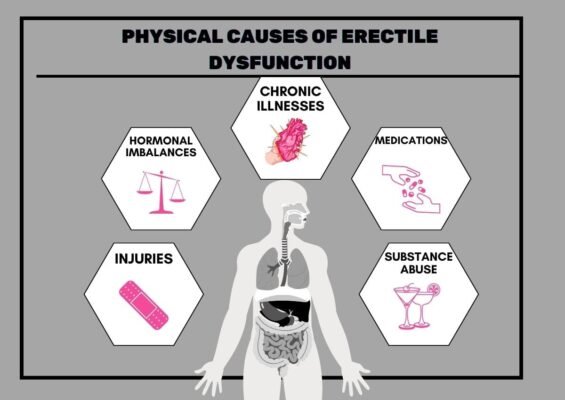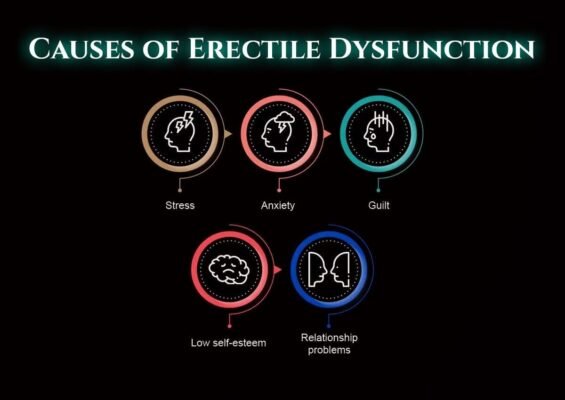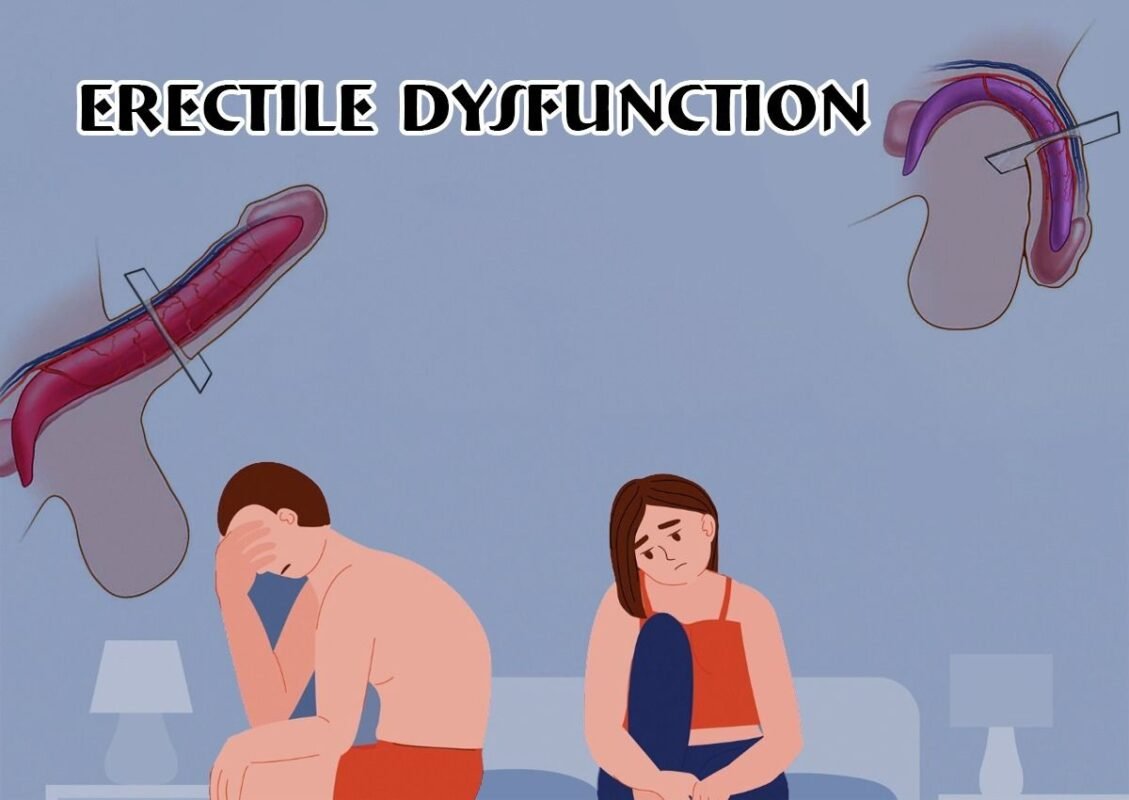No products in the cart.
Erectile Dysfunction
Erectile Dysfunction: The Comprehensive Guide
Erectile dysfunction (ED), the inability to achieve or maintain an erection firm enough for satisfactory sexual intercourse, is a common condition that affects millions of men worldwide. While it can be a source of significant distress, it’s essential to understand that ED is often treatable. This article aims to provide a comprehensive overview of erectile dysfunction, exploring its causes, symptoms, diagnosis, and treatment options. By demystifying this condition, we hope to empower individuals to seek appropriate help and improve their overall well-being.
Table of Contents
Overview of Erectile Dysfunction
Erectile dysfunction is a common condition that affects many men. It occurs when a man has difficulty getting or maintaining an erection firm enough for satisfactory sexual intercourse. This can be a frustrating and embarrassing experience, but it’s important to know that you’re not alone and that there are effective treatments available.
ED can have a significant impact on a man’s overall well-being, affecting his self-esteem, relationships, and emotional health. It’s essential to remember that seeking help for ED is a sign of strength, not weakness.
The Importance of Addressing ED
Erectile dysfunction can significantly impact a man’s overall well-being. Beyond the physical aspect, it can lead to emotional distress, affecting self-esteem, confidence, and intimacy. These emotional challenges can further exacerbate ED, creating a cycle that can be difficult to break. Addressing ED is crucial not only for maintaining a healthy sex life but also for preserving overall mental and emotional health.
Physiology of Erections
An erection starts with sexual arousal, which sends signals from the brain through the nervous system to the penis. These signals cause blood vessels in the penis to relax and allow more blood flow, leading to an erection. The veins that normally drain blood from the penis constrict to maintain the erection. Understanding this process helps in recognizing how various factors can impact erectile function.
How Erections Work
Getting an erection is a natural bodily function involving several systems working together. When a man feels sexually excited, his brain sends signals to the penis. Blood flow increases to the penis, filling the spongy tissues and causing it to become firm and erect. This process is influenced by both physical and emotional factors.
Factors Affecting Erections
Several factors can influence a man’s ability to achieve and maintain an erection. These can be broadly categorized into physical and psychological factors.
Physical factors include overall health, certain medical conditions, medications, and lifestyle choices. For instance, conditions like diabetes, heart disease, and high blood pressure can affect blood flow to the penis, impacting erections. Similarly, some medications might have side effects that interfere with erectile function.
Psychological factors also play a significant role. Stress, anxiety, depression, and relationship issues can all contribute to erectile difficulties. Feelings of guilt, low self-esteem, and performance anxiety can further exacerbate the problem.
Types and Prevalence of Erectile Dysfunction
The different types of erectile dysfunction and how widespread the condition is among men. It explains the distinctions between physical and psychological ED, giving readers a clear understanding of these categories. Additionally, it offers insight into the prevalence of ED, highlighting its commonality and the various factors that contribute to its occurrence.
Types of Erectile Dysfunction
Erectile dysfunction isn’t a one-size-fits-all condition. There are different ways to categorize it, helping to understand the potential causes and treatment options.
- Physical ED: This type arises from bodily issues. It might be due to problems with blood flow, nerve function, or hormone levels.
- Psychological ED: Mental health, stress, anxiety, or past experiences can contribute to this type of ED. It often relates to emotional factors.
- Combination ED: Many men experience a mix of physical and psychological factors contributing to their ED. This is a common type.
It’s important to note that these categories are for general understanding and might overlap. If you’re concerned about ED, consulting a healthcare professional for a proper diagnosis is crucial.
How Common is Erectile Dysfunction?
Erectile dysfunction is a common issue that affects men of all ages. While it’s often associated with older men, it’s essential to understand that ED can occur at any age. Younger men may experience ED due to various factors like stress, relationship issues, or underlying health conditions. As men get older, the likelihood of experiencing ED tends to increase. It’s important to remember that ED is a treatable condition, and seeking help can significantly improve quality of life.
Typical Age for Erectile Dysfunction
While erectile dysfunction can affect men of all ages, it’s more commonly associated with older age groups. As men get older, normal bodily changes can contribute to ED. However, it’s essential to remember that ED is not a natural part of aging and can occur at any age.
- Young Men: While less common, ED can affect younger men due to various factors such as underlying health conditions, medications, or psychological issues.
- Middle Age: This is when ED starts to become more prevalent. Hormonal changes, lifestyle factors, and certain medical conditions can contribute to its development.
- Older Men: The risk of ED increases significantly with age due to factors like decreased testosterone levels and the higher likelihood of chronic health conditions.
It’s important to note that these are general trends and individual experiences may vary. If you’re experiencing ED.
Recognizing Symptoms of Erectile Dysfunction
Erectile dysfunction can manifest in various ways, and recognizing the signs can be the first step towards seeking help. While it’s essential to consult a healthcare provider for an accurate diagnosis, being aware of common symptoms can provide valuable insights.
- Difficulty achieving an erection
- Erection inconsistency
- Decreased sexual desire
- Difficulty maintaining an erection
- Reduced erection firmness
Difficulty achieving an erection: This is the most obvious symptom of ED, where it’s challenging to get or maintain an erection firm enough for satisfactory sexual intercourse.
Erection inconsistency: Experiencing inconsistent erections, where you can achieve an erection at certain times but not others, can be a sign of ED.
Decreased sexual desire: A reduced interest in sex or libido can sometimes be linked to ED, although other factors can also cause it.
Difficulty maintaining an erection: Even if you can achieve an erection, struggling to retain it for a sufficient duration can indicate ED.
Reduced erection firmness: If your erections are softer than usual or not firm enough for penetration, it might be a symptom of ED.
If you are interested here is also an informative article: TENS Pads Placement for Erectile Dysfunction
Causes of Erectile Dysfunction
Erectile dysfunction can stem from a variety of factors, both physical and psychological. Understanding these causes of erectile dysfunction can be the first step toward addressing the issue.
Physical Causes of Erectile Dysfunction

Physical health plays a significant role in erectile function. Certain medical conditions, medications, and lifestyle habits can contribute to ED. These factors can affect blood flow, hormone levels, nerve function, and physical health.
Chronic illnesses: Conditions like diabetes, heart disease, high blood pressure, and obesity can affect blood flow to the penis, impacting erections.
Medications: Some drugs, including those for high blood pressure, depression, and prostate issues, can have side effects that affect sexual performance.
Substance abuse: Excessive alcohol consumption, smoking, and drug use can harm overall health and contribute to ED.
Hormonal imbalances: Low testosterone levels can impact libido and erectile function.
Injuries: Physical trauma to the pelvic area or spinal cord can damage nerves involved in erections.
Psychological Causes of Erectile Dysfunction

Emotional and psychological factors can also play a significant role in ED. Stress, anxiety, depression, and relationship problems can affect sexual desire and performance.
Stress and anxiety: Excessive stress or anxiety can interfere with sexual arousal and lead to ED.
Depression: Mental health conditions like depression can dampen libido and contribute to erectile difficulties.
Relationship issues: Problems in a relationship can impact sexual satisfaction and lead to ED.
Performance anxiety: Fear of not being able to perform sexually can create a self-fulfilling prophecy.
Diagnosis and Testing for Erectile Dysfunction
Understanding the process of diagnosing erectile dysfunction is crucial for seeking appropriate treatment. A healthcare professional will typically start by conducting a thorough medical history, inquiring about symptoms, overall health, and any medications you’re taking. This information helps them understand the potential causes of ED.
Diagnosing Erectile Dysfunction
Diagnosing erectile dysfunction typically starts with an open and honest conversation with your healthcare provider. They will want to understand your medical history, including any existing health conditions, medications you’re taking, and the nature of your erection problems. To gather more information, your healthcare provider might ask about:
- Your sexual history: This includes questions about the frequency of sexual activity, your ability to achieve and maintain erections in the past, and any changes you’ve noticed.
- Your overall health: Your provider will inquire about your general health, including any chronic conditions like diabetes, heart disease, or high blood pressure.
- Your lifestyle: Factors like smoking, alcohol consumption, and exercise habits can influence erectile function.
- Your emotional state: Stress, anxiety, or depression can contribute to ED, so your provider may discuss your mental health.
Based on your answers, your healthcare provider will determine if further tests are necessary.
Tests for Erectile Dysfunction
Determining the underlying cause of erectile dysfunction often requires a combination of medical evaluations. These tests help healthcare providers understand the physical and psychological factors contributing to the issue. While specific tests may vary, common procedures include:
Physical Examination: A thorough check-up to assess overall health and identify any physical conditions that might be affecting erectile function.
Blood Tests: To measure hormone levels, such as testosterone, and check for other potential health issues.
Urine Analysis: To rule out infections or other urinary tract problems.
Ultrasound: To examine blood flow to the penis and identify any structural abnormalities.
Nocturnal Erection Tests: To measure erections that occur during sleep, helping to differentiate between physical and psychological causes.
Psychological Evaluation: To assess emotional factors, such as stress, anxiety, or depression, that might be contributing to ED.
Management and Treatment Options
Erectile dysfunction can be managed through a combination of medical treatments, lifestyle changes, and psychological support.
Medical Treatments for Erectile Dysfunction
Medical treatments are often the first line of defense against erectile dysfunction. These treatments aim to help men achieve and maintain erections. While there are various options available, it’s crucial to consult with a healthcare professional to determine the most suitable treatment for your specific condition.
Oral medications: Drugs like Viagra, Cialis, and Levitra are popular options. They work by increasing blood flow to the penis.
Injections: These involve self-injecting medication into the penis to stimulate an erection.
Penile implants: In severe cases, a surgically implanted device can help achieve and maintain an erection.
Vacuum devices: These devices create a vacuum around the penis, drawing blood into it to produce an erection.
Hormone therapy: If low testosterone is the underlying cause, hormone replacement therapy might be considered.
See also: Can you take Viagra every day
It’s crucial to consult with a healthcare provider to determine the most suitable treatment option based on individual health conditions and preferences.
Non-Medical Treatments and Lifestyle Changes
While medical treatments can be effective for managing erectile dysfunction, many men find that lifestyle changes and alternative approaches can also be beneficial. These options often focus on improving overall health and well-being, which can positively impact sexual function.
Weight management: Maintaining a healthy weight can improve overall health, including sexual function.
Regular exercise: Physical activity helps boost circulation and can enhance sexual performance.
Diet: A balanced diet rich in fruits, vegetables, and whole grains can support overall health and potentially improve erectile function.
Stress management: Chronic stress can contribute to ED. Techniques like meditation, yoga, or deep breathing can help manage stress levels.
Sleep: Adequate sleep is essential for overall health and can positively impact sexual function.
Limit alcohol and smoking: Excessive alcohol consumption and smoking can negatively affect erectile function.
Counseling or therapy: Addressing underlying psychological issues can help manage ED.
Is Erectile Dysfunction Reversible?
Erectile dysfunction can often be managed and, in some cases, even reversed depending on its underlying causes. Many men find that lifestyle changes, such as improving diet, exercising regularly, reducing stress, and avoiding excessive alcohol or tobacco use, can significantly improve their symptoms. Additionally, addressing psychological factors through counseling or therapy can also be beneficial. It’s important to note that while some men may experience complete reversal of ED, others may find that managing the condition with ongoing strategies is necessary.
Preventing Erectile Dysfunction
While there’s no guaranteed way to prevent erectile dysfunction, adopting a healthy lifestyle can significantly reduce your risk. Maintaining a balanced diet, engaging in regular physical activity, and managing stress are crucial steps. It’s also important to limit alcohol consumption, avoid smoking, and manage underlying health conditions like diabetes, heart disease, and high blood pressure. These preventive measures not only support overall well-being but can also contribute to a healthier sexual life.
Long-term Outlook for Those with Erectile Dysfunction
Living with erectile dysfunction can be challenging, but it’s essential to remember that you’re not alone. Many men experience ED at some point in their lives. While there’s no one-size-fits-all answer, the outlook for individuals with ED has improved significantly with advancements in treatment options. It’s crucial to consult with a healthcare professional to understand the underlying causes of your ED and discuss the most suitable treatment plan for you.
By maintaining a healthy lifestyle, managing stress, and exploring available options, many men can experience improvements in their sexual function. Remember, open communication with your partner is also key to navigating this condition together.
Frequently Asked Questions
How does it feel when you can’t get an erection?
Experiencing ED can be frustrating and emotionally challenging. It’s common to feel a range of emotions, from sadness and anger to embarrassment and low self-esteem. Remember, ED is a common issue, and many men go through similar experiences.
What can I do if my partner has erectile dysfunction?
Open and honest communication is key. Let your partner know you’re there to support them. Avoid blaming or pressuring them. Suggest seeking professional help together if needed.
How do I know if my ED is physical or psychological?
Determining the root cause of ED can be complex. Physical factors like underlying health conditions, medications, or lifestyle choices can contribute. Psychological factors such as stress, anxiety, or relationship issues can also play a role. It’s often a combination of both.
Can lifestyle changes improve erectile dysfunction?
Absolutely! Making healthy lifestyle choices can significantly impact erectile function. Regular exercise, a balanced diet, weight management, and limiting alcohol and smoking can improve overall health, including sexual function.
Is erectile dysfunction a sign of other health problems?
Erectile dysfunction can sometimes be an indicator of other underlying health issues. Conditions such as heart disease, high blood pressure, diabetes, and hormonal imbalances can contribute to ED. Therefore, experiencing persistent erectile dysfunction may prompt further investigation into your overall health. Recognizing ED as a potential symptom can be an opportunity to address broader health concerns early on.
Takeaways
Erectile dysfunction is a common condition characterized by the inability to achieve or maintain an erection sufficient for satisfactory sexual performance.
ED can result from various factors, including:
- Physical conditions like diabetes or heart disease
- Psychological issues such as stress or anxiety
- A combination of both physical and psychological factors
Understanding the underlying causes can help in recognizing and addressing ED more effectively.
ED significantly impacts mental health and relationships.
Open communication with partners and seeking support can improve coping mechanisms.
It is essential to approach the topic with sensitivity and understanding, acknowledging that ED is a manageable condition.
Treatment options for ED include:
- Lifestyle changes
- Therapy
- Medications like Viagra and Cialis
Incorporating healthy habits such as regular exercise, a balanced diet, and stress management techniques can contribute to better sexual health.
It’s crucial to consult healthcare professionals for personalized advice and treatment plans.
This article provides valuable information about ED but should not replace professional medical consultation.
Understanding ED and its implications can empower individuals to take proactive steps toward better health and well-being.
Reference
https://www.niddk.nih.gov/-/media/Files/Urologic-Diseases/
https://www.urologyhealth.org/documents/Product-Store/English/
https://www.ahrq.gov/downloads/pub/evidence/pdf/erectiledys/erecdys.pdf
https://www.aafp.org/pubs/afp/issues/2016/1115/p820.pdf
https://urology.ucsf.edu/sites/urology.ucsf.edu/files/
https://www.auanet.org/documents/Guidelines/ED%20Website%20Final.pdf


